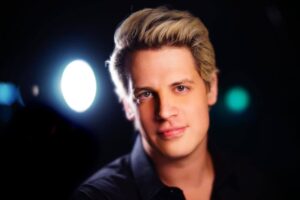Tag: Taylor Godfrey ’19
Come for the Food, Stay for the Experience
by The Cowl Editor on February 15, 2018
Campus

by Taylor Godfrey ’19
Opinion Co-Editor
If there is one thing that will convince a Providence College student to come to an event on campus, it is free food. If that food is PVDonuts, it is basically guaranteed that they will be making an appearance. So when the College’s Inside Out Week events involved a “Set Your Intention” workshop including PVDonuts, students did not hesitate to mark their calendars.
This event required pre-registration, as one of the students running it explained, because they did not want students simply showing up for donuts and leaving. Students, of course, laughed at the thought of doing such a thing, yet felt guilty in the back of their minds because they had come to the workshop aiming to do just that. But when students took the time to slow down and really appreciate the rest of the activities, they found that the break from work and studying was exactly what they needed and that they should appreciate campus events for more than just the free food.
The all-important donuts were present at this event, but the main objective was for students to create vision boards to “set their intentions,” as the name of the workshop suggested. There was an array of pretty colored scrapbook paper, stickers, inspirational quotes, and glittery washi tape that students could use to decorate a little canvas and uplift them during a time when everyone is starting to really stress about classes and work.
We all have busy schedules and between classes, papers, reading, and extra-curriculars, it seemed silly to take time out to do arts and crafts. But those 20 minutes do not impact someone’s schedule very much, and students can then return to my work with more clarity and ability to focus. In the end, students have a much more productive break than they would have if they had just snagged a donut then and procrastinated later by scrolling through social media.
This does not just go for Inside Out Week events either. Between the colorful cards littering the tables in Ray to overstuffed bulletin boards and the Morning Mail emails we get every day, there are clearly a plethora of different activities happening around campus all the time. It is easy to simply dismiss them either because the sheer number is overwhelming or because our schedules are jam-packed as it is. But these four years are a chance to attend some great events for free.
There is no shame in attending campus events because of free food. Anyone who plans events on campus will tell you that having snacks available is a great way to boost attendance. But while you are there grabbing pizza or donuts, try to appreciate the event itself as well.
Not only did someone put in a lot of effort to put that hour or two together so you could go enjoy the culinary offerings, but you might find the experience is a lot more enjoyable and beneficial to you than you originally thought. And who knows, you might come out of it with not only a deepened love and appreciation for donuts, but a little inspiration to get you through your day as well.
Climate Change Threatens Future of Winter Olympics
by The Cowl Editor on February 8, 2018
Editorials

by Taylor Godfrey ’19
Opinion Co-Editor
From hockey to skiing to ice dancing to curling, there are plenty of sports to get excited about during the Winter Olympics. The games are a time to come together as an entire world and to celebrate not only our differing nationalities but also our commonalities as one human race. But how can we come together as a world if that very same world is the one we are slowly killing?
The 2018 Winter Olympics start this Friday, February 9, in PyeongChang, South Korea, and according to research reported by The New York Times and conducted by Daniel Scott at the University of Waterloo in Ontario, PyeongChang may soon be one of the only cities in the world left able to host the winter games
Scott analyzed data from past Olympic host cities as well as climate change models to determine that in 50 years, nine of the previous host cities will be too warm to host the Winter Games again. This data is staggering, considering that two of the cities, Sochi, Russia and Vancouver, Canada, each played host to the Winter Olympics in the last 10 years. Yet by the middle of the century, neither will likely have cold enough temperatures to host them again.
Climate change can often seem like a vague problem, distant from our everyday lives. We do not feel a dramatic rise in temperature every time we throw out a styrofoam cup or fill up our cars with gasoline. Yet, this study puts the problems with global warming into perspective.
Temperatures rising just a few degrees can spell disaster for many venues of outdoor sports. According to the Times article, temperatures were so warm during the last Winter Olympics in Sochi that some sports, like the snowboard halfpipe, became downright dangerous due to unsuitable conditions.
This could affect the future of the Olympics as well. If future elite athletes no longer have access to the frozen ponds and snowy hills where many get their start, how many people will be able to participate in future Winter Olympic Games?
And this problem does not just pertain to elite events like the Olympics. If rising temperatures threaten the places where Olympic Games have historically been held, they will threaten the places where ordinary people go to ski or snowboard or skate as well. If places in Canada and Scandinavia are no longer able to support outdoor winter sports, that will certainly limit the areas accessible to, say, students living in Providence, Rhode Island.
During the 2014 Winter Olympics, 105 athletes partnered with environmental advocacy group Protect Our Winters to release a statement calling on more government commitments to stop climate change, according to National Geographic. Now, four years later, the same problems continue to persist.
And while big environmental change should come from governments and organizations with power, there are things ordinary people can do as well. Using reusable containers or water bottles to reduce waste, or carpooling or taking advantage of mass transportation options to limit carbon emissions, are a good start.
This is not just about changing actions, but shifting an entire mindset around global warming and climate change. It affects everyone, and no, saying “Well, I’m more of a Summer Olympics person” is not an excuse.
The Olympic Games are a good reminder that while we all come from different places and diverse backgrounds, there is one thing we all have in common: we all call this planet home. And it is the only one we have, so we have to make an effort to protect it, not only for the future of winter sports as we know them, but for every future person who will someday call this planet home too.
Tangents and Tirades
by The Cowl Editor on January 25, 2018
Opinion

Be Open to Learning
In light of Dr. Bernice A. King’s address last week, in which she advised students to be open-minded, it is important that we continue to educate ourselves as a community.
Last Friday, January 19, a panel of Providence College professors spoke about their research regarding diversity and the legacy of Rev. Dr. Martin Luther King, Jr.
Due to the large audience that attended Dr. King’s speech, one would expect there to be a crowd of intrigued students at last Friday’s forum. However, this was not the case. In fact, the assembly was primarily composed of faculty members.
While an event at 3:00 p.m. on a Friday afternoon might not draw the largest group, the topics that were discussed are pertinent to the current campus environment.
The panel was a fitting way to close the College’s MLK Convocation week. The professors who spoke explained the influence that Dr. Martin Luther King Jr. had on their own lives, as well as the psychology that explicates interracial tensions.
The best way to contribute to the solution of an issue is to educate oneself about the problem. While sitting in a room listening to professors talk might not seem like much of a resolution, it is one step in undertaking the concern for diversity on our campus.
Attending events such as the Humanities Forum are beneficial in that they help us to better understand the problem and encourage us to listen to other perspectives.
-Hannah Paxton ’19
In Search of Truth on Social Media
Once a “breaking news” alert rumbles on a person’s phone, the starting pistol blares in the race to get the most likes on social media. Instead of carefully thinking about issues and considering other arguments, people flood their newsfeeds with their gut reactions.
In a blur of tweets, all gray area is buried under a mound of extreme and hasty posts. Things either “suck” or are “awesome,” people are either “evil” or “heroes,” and all nuance gets ridiculed with dislikes from the mob. Surrounded by over-the-top rhetoric, people join in the chorus in order to fit in, without independently thinking about the issue. After all, liking a movie that “sucks” or a politician that is “evil” does not get likes, as people chip away at their individuality to seem “right” on Facebook.
Worst of all, this flood of gut reactions distorts reality. These baseless accusations and blatant lies hide the facts, serving as a “bodyguard of lies” as Winston Churchill infamously warned. Even with gravely serious news events like October’s Las Vegas shooting, uninformed posters blurted out wild conspiracy theories without a shred of evidence, simply to get likes.
In a matter of seconds, posters blamed a fictitious “Samir Al-Hajeed” who supposedly attacked the country festival in the name of ISIS, a radical leftist named “Geary Danley” who sought revenge against conservative country music fans for the 2016 election, and even the federal government. As baseless as these claims were, thousands retweeted without thinking.
When the next breaking news alert rumbles, think before you post. Become informed, consider different arguments, and carefully consider the evidence and logic of people’s claims. Instead of having grieving families sift through conspiracy theories blaming the Illuminati and New World Order, wait until the facts arrive.
-Nicholas Moran ’19
It is Time to Fix FixIt
After two years of living in traditional dorm housing and a semester abroad, this spring semester I was excited to finally experience one of the joys of upperclassmen housing: a private bathroom. To go from sharing a communal bathroom with thirty of your closest friends to only four feels like a dream come true—if the bathroom actually works, that is.
Moving into my apartment only to find that the plumbing was not in working order and that now, over a week later, the issue still has not been resolved, points to a real problem in the way that maintenance concerns are being handled.
I know that the Office of Residence Life is very busy and has perhaps the hardest job on this campus—coordinating effective housing for thousands of students is not easy—but it is not acceptable for an apartment’s singular bathroom to be continually out of working order with no reprieve in sight.
At this point, I have exhausted all of my resources. My roommates and I have sent multiple emails, made calls, and even visited the Residence Life office in person. All I have left is one desperate plea.
The way that maintenance issues are prioritized and then fixed must be adjusted. If not for me, then for anyone else whose dreams of apartment-style living have been crushed and who are forced to run down to the basement of their building every morning in their pajamas just to use a working restroom.
-Taylor Godfrey ’19
Making the Most of a Semester Abroad
by The Cowl Editor on January 18, 2018
Editorials

by Taylor Godfrey ’19
Opinion Co-Editor
Going abroad is one of the most talked about aspects of life at Providence College. Deciding whether or not to go, choosing a place, committing, organizing yourself, and submitting all of your documents on time: it is a daunting task for any student.
While many students will go abroad, many will go with friends or in a program with PC or American students. However, it is important to remember that one of the most fulfilling aspects about spending a semester abroad is gaining a new experience for yourself that you could not have gotten at PC.
Last semester, I chose to study at King’s College London and while I knew there would be a few other PC students there, I did not choose a program specific to this college.
I knew that none of my friends who were going abroad would be in at the same school or even in the same city as me. When I was thinking about going abroad, I did truly feel like I was going alone.
While I say that I felt like I went abroad alone, I was not really alone. King’s College London had over 600 study abroad students during the fall semester, and that is not counting the nearly 30,000 full-time students, or the over eight million people that call the city of London home. I had many people around me; I just had not met any of them yet.
While it is fun to travel with friends you already have, there is something special about being on your own in a new place.
Starting at King’s felt like starting freshman year at PC all over again, which at first was very nerve-wracking. However, I came to appreciate the fresh start. No one at my new school knew me, and I got a chance to have a completely new experience.
The trouble with going abroad in groups is that it can be easy not to branch away from those groups. It is comfortable to stay with what you already know, and it can be easier to spend all your time with already established friends.
Two of my flatmates last semester were also American study-abroad students, and they spent most of their time with other American students in their programs. In this case, studying abroad is less of gaining a new experience and more of having an experience very similar to what you would get on campus, simply in a different place.
When I was planning my abroad experience, I did not plan to go on my own because I thought it would make it a better experience. I just happened to be interested in studying in a place where none of my friends were interested in studying.
However, having a semester abroad that was completely unlike anything I could have experienced at PC and with people I would never have met at PC made my experience more fulfilling.
While I did find the thought of starting over again at a new school daunting, I am better for the experiences I gained in forging my own path. Before I found my new friends at my new university, I went out and explored London on my own, learning to navigate the underground system and to rely on myself and my own abilities.
And while I may not have started the semester with friends, those friends did come and now I have made connections with other study abroad students from the U.S. as well as other students from the U.K. and Europe.
These friends gave me different perspectives and helped me to make global connections that I may not have made if I had been able to rely on friends that I already had.
There is a reason that PC does not allow more than two of its students to live together when they study abroad. The whole point of going abroad is to gain a new experience and to make connections with people you would never have met in Providence.
That is not to say that people who go abroad with big groups of PC students cannot have a full experience, simply that making some time to spend exploring your host city yourself and making an effort to meet people from your host country and beyond will only make your abroad experience richer.
100 Days of Trump
by thecowl.opinion on May 4, 2017
Opinion

by Taylor Godfrey ’19
Opinion Co-Editor
While it seems like only yesterday everyone watched a very rain-soaked and supposedly well-attended inauguration, we have now reached the 100th (or rather 105th by the date of this publication) day of Donald Trump’s presidency.
This is the mark by which a president’s term is often judged and the news sites are all covered with articles either exalting or denouncing Trump’s accomplishments, or lack thereof, during what are possibly the most important days of his term. While political scientists as well as half of your Facebook friends will probably discuss the ramifications of the past 100 days for years to come, all of the commentary begs the question, is this evaluation even worth anything?
The significance of the 100-day milestone for presidencies has been around since Franklin D. Roosevelt’s presidency, when the pressures of the Great Depression necessitated a swift course of action from the president in a very short period of time. In a press conference on April 19, the White House claimed that Trump has had a more successful first 100 days than any president since FDR. Presidents love to compare themselves to this historically beloved figure, but unless a country is in such dire straits as Roosevelt’s was, this 100-day landmark is arbitrary and not necessarily indicative of a president’s overall success.
Why should a president passing a bill in his or her first hundred days make that bill any more or less important than legislation they pass at any other point over next four years?
If anything, the pressure to succeed in such a short amount of time only encourages a quantity over quality mentality. And if there is any job in the world that should focus more on valuable work and less on volume of work, it is the president of the U.S.
This magnifying glass centered only on the first 100 days of a presidency also encourages a president to put the reputation of the office above all else. When Trump’s White House claims that he has been more successful than any other president since FDR, his office does not care whether or not it is true. What is important is that the country thinks it is true and the claim will therefore bolster the trumped up superiority of the 100 days.
However, Trump, and most likely the presidents that follow him, are trying to live up to a standard that is unrealistic. The country should not want the president to have to do as much in his or her first 100 days as Roosevelt did because that would mean the U.S. was facing a problem as catastrophic as the Great Depression.
In addition, the mystique of this arbitrary time period causes presidents to make wild promises that they cannot possibly keep because the public is expecting a fully loaded docket of plans for those three fleeting months.
Trump promised in the 100-day plan he released in October 2016, to, among other things, repeal and replace the Affordable Care Act, eliminate corruption in Washington and “drain the swamp,” suspend immigration from “terror-prone regions,” and lift “roadblocks” against projects like the Keystone Pipeline, according to NPR.
The latter two he has at least addressed, though to varying degrees of success. He has not suggested any legislation to “drain the swamp,” and his administration’s attempts to repeal and replace Obamacare have been an abysmal failure so far. He has not succeeded at most of the things he promised to accomplish in 100 days, though his administration claims he has been wildly successful.
The most problematic thing is not that Trump has not accomplished all of these goals (whether you agree with them or not), the problem is that Trump still has 1360 days left in office. We must not stop scrutinizing his decisions or being as vigilant after these 100 days are over.
We must try to block out all of the voices yelling about this important milestone, because Trump’s presidency is far from over and it would be foolish to think that the actions taken during these 100 days will be the only ones that matter.
Instead of overanalyzing the past three months, we should wait and evaluate Trump when he is out of office. Only from that vantage point, or even better from a few years from now, can we truly evaluate the good and the bad of his term. For Trump, as for every president, the first 100 days are just the beginning. Rather than trying to figure out if Trump’s short time in office means he will be an effective leader, let’s remember how much time we have left still and focus all of our energy encouraging him to be one.
Tangents and Tirades
by thecowl.opinion on April 27, 2017
Opinion

Marching For Facts
$2.6 billion. That’s $2.6 billion less dedicated to clean air, water quality, reducing emissions, and climate studies after President Trump cuts the budget of the Environmental Protection Agency (EPA). Billions of dollars taken away from the commitment not only to environmental care, but public health and safety as well. To ignore environmental concerns is to ignore the plain facts, and that’s why people marched for science last Saturday.
With the creation of the EPA, President Nixon once said that protecting the environment was “a cause beyond party and beyond factions,” and for good reason. So much of politics today is one viewpoint versus another, but all signs of science (otherwise known as facts) point to a climate that is under threat.
The fact that Trump plans to take money out of the budget suggests that scientific research has all been for nothing, that it holds no significance in our society. But this couldn’t be further from the truth. Scientific investigation has helped immensely in terms of dealing with the issue of climate change, to the point where 97 percent of experts agree that humans are responsible.
For those who might say that the March for Science won’t change any minds, that is not necessarily the point. Science matters. The facts matter. Taking care of the planet matters. Reducing the environmental budget is not going to change the fact that the conservation of the earth is of primary concern.
– Hannah Paxton ’19
Take Advantage of Spring Shows
A musical, a band concert, a dance club performance, an A cappella show—these are just a few of the artistic performances that have happened or will happen during these last few weeks of the semester. They are events that are sometimes simply passed over by students as just another blurb on that colorful card on the tables at Ray, but they are really a unique opportunity that college students should not miss out on.
We are in a rare position at Providence College, as are those in colleges around the country, in having many different kinds of entertainment just steps away and often at a reasonable price, if not completely free. And though we all have busy schedules, we should try our best to attend as many of these events as we can while we are here.
Professional singers, dancers, and performers all started somewhere, many of them on stages just like the ones in Smith. The student performers on campus will be these people someday too, and it will cost a lot more to see them once they leave.
I attended a performance of Into the Woods a few weeks ago and a student ticket was only $5. Where else but a college campus can you enjoy such quality entertainment for the price of a cup of coffee?
-Taylor Godfrey ’19
No Progress, Just Nuisance
Walking to my VW Beetle is usually a quick, pleasant trip, especially after I snag a coveted spot in the Glay Parking Lot. However, now when I walk to my car, I’m greeted by an ugly, inconvenient fence blocking off Huxley for a construction project with non-existent progress.
The fence, which stretches from the Cunningham lawn to the Glay Lot entrance, annoys anyone who walks down Eaton Street or parks his or her car. It turns my two minute walk into ten because it takes away one of the entrances to the lot and forces students to walk around. It’s a massive, literal roadblock in the middle of campus, ruining the spring aesthetic just in time for graduation.
Sure, the fence exists so that Huxley can become a walkway rather than a street, and construction is a messy affair. I would be willing to sacrifice beauty and convenience for a few months in the name of progress if actual progress were being made. However, the only thing that has changed in the fenced-in area during the last few weeks is the transformation of the Cunningham lawn into a mud pit.
If you’re going to start construction, please start construction. If you’re not going to start construction, please give me my walkway back. I’m just trying to get to the grocery store.
-Brianna Abbott ’17
Banning Books, Silencing Voices
by The Cowl Editor on April 6, 2017
Opinion

by Taylor Godfrey
Asst. Opinion Editor
Last week I went to the library to check out a copy of Margaret Atwood’s The Handmaid’s Tale in anticipation of the upcoming Hulu series that is premiering this month. As I pulled the book off the shelf, I noticed a big red sticker splashed across the cover that said “Caution! Banned Book,” as well as a smaller one explaining where and why the book was banned.
While these stickers were part of a celebration of Banned Books Week—a week every September that raises awareness of censorship in the United States—and not an attempt by Phillips Memorial Library to dictate what I read, it still concerned me. Even today, censorship remains an important issue and one which is dangerous to all of the values the United States is supposed to espouse and respect.
According to the American Library Association (ALA), over 11,000 books have been challenged since 1982 when Banned Books Week was started to raise awareness of the issue. A book being challenged means someone wanted it removed from a school’s curriculum or a library, while a book being banned means it was removed.
While many of the reasons people cite for banning books are to protect others, especially children, from sensitive topics, restricting the flow of open information and discussion really causes more harm than good.
This is also an issue for all sides of the political spectrum. On the ALA list of top ten books banned in 2015, there were books about transgender kids, such as Jazz Jennings’ autobiography I Am Jazz, that were censored for being “anti-family,” but The Holy Bible also found a spot on the list for its “religious viewpoints.” All sides seem afraid to confront ideas and values different from their own.
And many books that are widely read and seemingly apolitical, like J.K. Rowling’s Harry Potter series, have been challenged many times—in this case for centering on themes of witchcraft.
In today’s political climate, with the president often denouncing many media outlets for supposedly reporting false news, it seems that widespread censorship could be only steps away. One of the most important tenets of the Constitution is the right to freedom of speech, but no one’s speech is really free if ideas and books can just easily be suppressed, banned, and removed from the conversation.
While a few hundred books being removed from libraries scattered across the country might not seem like a big deal, this is only a small part of a larger problem. If people only ever read and interact with viewpoints similar to their own, it will only cause them to dig their heels in further and further on their own side and any discussion about important issues in our country will stagnate.
This is especially important for children, as many of the challenged books are children’s or young adult books. But if children are only ever exposed to ideas that reflect the ones their parents hold, how can they form their own opinions and be their own people?
If you have ever read a particularly moving book, you know the power of reading. It is a power that is incompatible with hatred, closed-mindedness, and bigotry. It is a power that is needed in today’s world that seems to be increasingly filled with these things. Reading other people’s thoughts and ideas brings you out of yourself and can show you a wider world. And it is important that it stays that wide and not constricted by fear or hatred.
No Check, No Balance
by The Cowl Editor on February 16, 2017
Opinion
by Taylor Godfrey ’19
Asst. Opinion Editor
Isn’t it the worst feeling to get the mail from your mailbox at home and see that envelope with those three words that can ruin your entire day: “official juror summons?” No one likes to go to jury duty, but the courts are a necessary part of life in a democracy and most of us can recognize that fact, even as we bemoan our civic duty. Most of us, that is, except our president.
As the country struggles through this rather long adjustment period to the new presidency, it is becoming increasingly clear that the new leader of our nation is a big fan of executive power. He has issued 12 executive orders in the first three weeks that he has held office. What the president is having more trouble with—and what should be the most concerning—is the complete lack of regard he has shown for the judicial branch.
Trump’s most publicized executive order was his immigration ban, blocking citizens from seven Muslim majority countries from entering the U.S., as well as halting the refugee program. There has been a serious outcry against this ban, and while those protestors are right to be angry, Trump’s response to the backlash and the subsequent judicial reviews is possibly even more concerning than the order itself.
Trump’s administration has shown serious disrespect and even disdain for the United States’ court system. Trump has questioned the authority of a federal judge who ruled against his travel ban as well as belittled the power that the court has over his actions and decisions. Trump may think that winning the presidency means obtaining absolute power over the entire country, but that is not how the government ever has or hopefully ever will function.
Last Thursday, a federal appeals panel denied Trump’s bid to reinstate his travel ban after a federal judge blocked parts of it. According to The New York Times, the decision stated that Trump did have the power to create such executive orders, but he could not claim that “national security concerns are unreviewable, even if those actions potentially contravene constitutional rights and protections.” The courts reaffirmed their right to check presidential power and settle problems of constitutionality.
The Founding Fathers lived under a government that did not listen to them and a single monarch with a great deal of power. They created a three-branch government with a system of checks and balances to avoid the very thing that Trump seems to want. Without these checks, there can be no balance. An unbalanced government is not a government that will help its people, but it might actually hurt its people if it does not follow the rules that have been set down for it.
Without the judiciary, the government would have a single ruler with no checks. Without the judiciary, the United States would not be the democracy for which our founders fought so dearly. Without the judiciary, and especially with a Republican Congress, the role of the president would look a whole lot like a dictatorship.
After the rejection of his ban, the president tweeted, “SEE YOU IN COURT, THE SECURITY OF OUR NATION IS AT STAKE!” and for one of the few times in his campaign or presidency, he was actually right. The courts will and must continue to question and check Trump’s executive orders and actions, because if they do not, the safety of the entire country truly will be at stake.
Free Speech Is Not A Free Platform
by The Cowl Editor on February 9, 2017
Opinion


by Taylor Godfrey ’19
Asst. Opinion Editor
In a world of fake news and “alternative facts,” it can sometimes be difficult to decide where to draw the line between free speech and hate speech. But under a president who has no problem ignoring his people’s calls for change and tweeting that “any negative polls are fake news,” it is a problem we must address. Much of the tension surrounding this issue came to a head at the University of California Berkeley campus on the night of Feb. 1. Right-wing writer and blogger Milo Yiannopoulos was booked by the University of California, Berkeley College Republicans to speak on campus.
This announcement was followed by 100 faculty members signing letters of protest, as well as people arriving at the event to protest in person. As the night went on, however, the peaceful protest devolved into a riot that resulted in the cancellation of the event. After that night, many are calling the students’ protest an affront to the freedom of speech guaranteed in the Bill of Rights. Leaving aside the riots that endangered students’ safety, however, the calls for cancellation of the event did not violate freedom of speech. The protesters at Berkeley did not infringe on Yiannopoulos’s right to free speech. They did not shut down his website. They did not forbid him from speaking at other places. They did not put him in prison for saying things they disagreed with. The students and faculty at Berkeley did not silence Yiannopoulos, they simply refused to give him a megaphone, and that is really the big difference.
According to the New York Times, the faculty letters calling for the cancellation of the event cited a speech that Yiannopoulos gave to the University of Wisconsin in which he harassed a transgender student by name. He has also been banned from Twitter for inciting attacks on celebrity Leslie Jones. Despite what he might have said at this appearance at Berkeley, his past actions indicate that he is not opposed to being highly offensive and even stooping to the level of hate speech. It is clear why students would not want such a person to speak at their school. It is a good thing to listen to opposing views and expose yourself to people who you do not agree with. However, opening a discourse to debate and discuss political ideas, especially about sensitive subjects, should be done with respect from both sides. From what Yiannopoulos has said and done in the past, a discourse with him would be anything but respectful or even civil.
It is important, especially now, to understand and protect freedom of speech. Students and faculty did not want Yiannopoulos to speak at their school, not because of his right-wing ideas, but because of the way he often delivers them interspersed with hateful speech. They simply did not want his often hate-filled ideals to be associated with themselves and their school. But this is about more than one protest and riot on one college campus. This is an issue which has been at the forefront of the political scene since the early days of Trump’s campaign. Trump often lashes out at programs and people that speak negatively about him. He has called news stations like CNN “fake news” when they report things he does not like.
These practices could easily devolve into something much worse. We need to be watchful that these do not become something that really does violate the tenets of the freedom of speech.
42.2 Million
by The Cowl Editor on February 2, 2017
Opinion

by Taylor Godfrey ’19
Asst. Opinion Editor
42.2 million.
That is the number of immigrants currently living in the United States, according to the Center for Immigration Studies. Immigrants make up every part of life. They teach, they do research, and they are an integral part of American society. The United States was founded by immigrants like these. The nation is a melting pot, a country of diversity which has offered new hopes and opportunities for hundreds of years. Immigration is at the very core of the United States. Which is why it is so saddening to see new executive orders coming from the White House that are barring just that.
On Jan. 27, our president signed an executive order barring immigration for 120 days and banning people from Libya, Iran, Iraq, Somalia, Syria, Sudan, and Yemen from entering the United States. The order has caused a lot of uproar and even more confusion as immigrants from these countries struggle to figure out if they are allowed back into the country and allowed home. Wherever they may have come from originally, for many people the United States is now their home, and they deserve to live here just as much as natural born citizens do.
It is not just casual visitors that are being blocked. Students and green card holding permanent residents were barred from entering the country after the order took effect. The fact that the original order does not take into account a person’s individual status in terms of holding a Visa or a green card disregards the system we have for immigration in favor of hasty decisions fueled by fear. The actual enforcement of this order has been shrouded in confusion. It is unclear how often or how strictly it is being enforced or what its fate will be after the orders from several federal judges condemning it.
But that is not even the heart of the issue. The huge, glaring problem is that this order was even written. Just as he said in his campaign promises, President Donald Trump has targeted predominantly Muslim countries. He has created a preference for Christian refugees in particular. But the United States has no state religion. The state is supposed to be separated from the church, and a Muslim life is worth just as much as Christian one—regardless of any orders that may come from the president.
Many of the people being denied access to the United States will be refugees. They will be fathers and mothers with nothing. They will be malnourished children who are scared and confused and above all need help. And if we refuse to help them we are just as bad as the people they are fleeing from. This order came from a place of hate and fear. With acts of violence all over the world being sensationalized in the news, it is no wonder that people are scared. But we cannot allow fear to give into hatred. One of the most important tenets in the Bible is to “love thy neighbor.”
This order does the exact opposite of that. It brews hatred and prejudice and gives in to bigotry and intolerance. This country barred Jewish refugees in the 1940s and effectively sent them to their deaths.
We must learn from our mistakes, and we must never make that mistake again.
